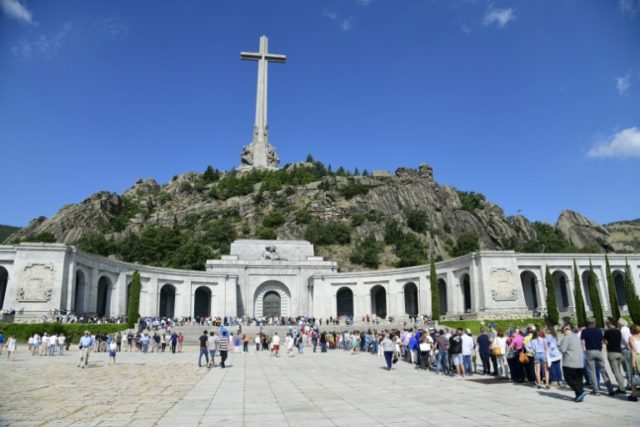Madrid (AFP) – A dark and painful part of Spain’s history will be brought back under the spotlight Thursday when the remains of Francisco Franco are exhumed from a landmark basilica in the hills near Madrid.
The delicate operation to move his remains to a more discreet resting place will take place on Thursday morning, despite a long-running legal battle by the late dictator’s family.
But it threatens to open barely-healed wounds in a nation riven with contradictions — where more than 100,000 people are still listed missing following the 1936-39 Civil War and its aftermath, yet where villages bear names in honour of the dictator who ruled until his death in 1975.
“Obviously, there are wounds which remain raw given you have more than 100,000 people still lying in ditches and mass graves,” said Alejandro Quiroga, a historian at Britain’s Newcastle University.
The figures, he said, make Spain the country with the second-largest number of ‘disappeared’, after Cambodia.
And 44 years on, the single biggest symbol of the war and the decades of dictatorship is the Valley of the Fallen, a vast temple-like complex some 50 kilometres (30 miles) northwest of Madrid, where Franco is buried.
The very fact that such a monument exists makes Spain the “great anomaly of western Europe” with no such parallel in any other European state that survived a totalitarian leader, be it Germany, Italy or Portugal, says Julian Casanova, professor of modern history at Zaragoza University.
Topped by a 150-metre (500-feet) cross, the hillside basilica has attracted both tourists and rightwing sympathisers, with many on the left repulsed by the memorial, comparing it to a monument glorifying Hitler.
And for that reason, the government of Socialist Prime Minister Pedro Sanchez has insisted on Franco’s remains being removed, saying Spain should not “continue to glorify” the dictator.
Built by General Franco’s regime between 1941 and 1959 — in part by the forced labour of some 20,000 political prisoners — the site contains the remains of more than 33,000 dead from both sides of the civil war.
But it has long been a draw for those nostalgic for the Franco era, who go there to hold masses in his honour and celebrate his memory.
Historians agree that removing Franco’s remains from the Valley of the Fallen would be a “step” towards normalisation for Spain, a country which still has villages named “Caudillo” in honour of the dictator, and streets recalling senior figures within the Franco’s regime.
– Law of historical memory –
But where do these contradictions come from?
Firstly, unlike other figures like Hitler or Mussolini, Franco survived World War II and did not drag Spain into the conflict, dying three decades later while still in power.
On his death, the political leaders agreed on a transition to democracy which “maintained the political, social and economic elites that existed under Franco.. and implicitly maintained the idea that the Franquist past would not be the basis for political confrontation,” explained Quiroga.
And this allowed “the senior administrators of the state and the judiciary to maintain a very conservative profile for a large part of the democracy,” explained Marc Gil, a historian at Catalonia’s Open University.
But in 2007 the Spanish parliament, under a Socialist government, approved the “historical memory” law which was aimed at giving greater recognition to victims on both sides of the civil war, which was triggered by Franco’s rebellion against an elected Republican government.
It involves the removal of all symbols honouring Franco and requires the state to collaborate in the search for and exhumation of the mass graves of those who disappeared.
But its implementation has been blocked by the right, leaving those associations dedicated to tracking down the disappeared to pursue their thankless task “entirely alone”, said Gil.
– Persistent divisions –
Reflecting on recent history has also been hampered by political divisions, with the left lobbying for reparations for those who lost the war and were subjected to reprisals, but the right accusing them of wanting to reopen grievances that remain firmly in the past.
Earlier this week, Pablo Casado, who heads the rightwing opposition People’s Party, which was founded by former Franco ministers, said he would not waste “even one minute talking about what happened in Spain 50 years ago.
His predecessor Mariano Rajoy often bragged during his term in office (2011-2018) that not even a single euro was wasted on applying the historical memory law, which was opposed by his party.
“When you speak about Franco and about history, the PP’s attitude is not even close to that of a democratic party, which is truly exceptional in Europe,” said Casanova.
But the most extreme position belongs to Vox, which in April became the first far-right party to enter parliament since Franco’s death, and which could end up being the third or fourth-largest faction in Congress when the country holds a general election on November 10.
For its leader Santiago Abascal, the exhumation of Franco is “a profanation which goes against the will of the family”.

COMMENTS
Please let us know if you're having issues with commenting.